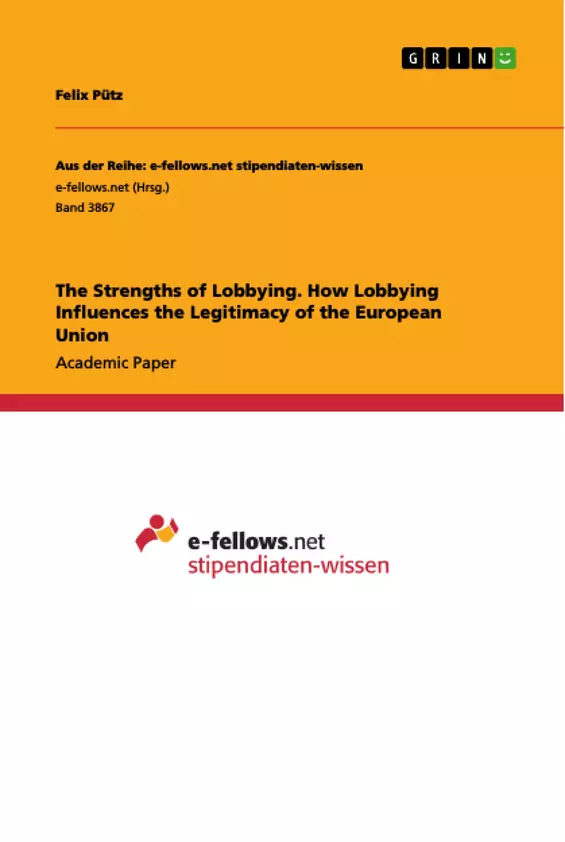Over the past 20 years, the number of lobbyists in Brussels increased rapidly. The Lisbon treaty of 2009 reinforced this effect drastically as EU institutions became more powerful. Consequently, there was a shift in the lobbying strategy of many interest groups increasingly focusing on EU decision makers instead of state governments. In 2017, approximately 15,000 lobbyists were positioned in Brussels. The rising trend of lobbying in the EU has several effects on policy and decision making of EU institutions. The European Union finds itself in a challenging position due to the rise of eurosceptic parties, problems with European integration, the economic crisis, and the overall concern about the democratic legitimacy of the EU.
Legitimacy as a concept describes the rightfulness of a government in terms of either doing the right thing in the right way with the right people or in terms of political sciences as the overall belief of society in the rightness of the system. The legitimacy of the EU is debatable, and lobbying is on a rising trend. Therefore, this paper addresses the following research question: Does lobbying facilitates or impedes EU’s legitimacy?
Firstly, the paper focuses on the definitions of the key concepts and links them to the EU. Secondly, responsible lobbying will be discussed. Additionally, the paper will investigate the relationship between lobbying in the EU and legitimacy more in depth, by using the author's own framework, while considering several dimensions and scales of lobbying and by citing multiple examples. Lastly, a conclusion will be given.
Inhaltsverzeichnis (Table of Contents)
- Introduction
- Definitions of key concepts
- Legitimacy and the EU
- Lobbying and the EU
- Responsible lobbying
- Lobbying and legitimacy
- Responsible lobbying and legitimacy
- Irresponsible lobbying and legitimacy
- Conclusion
Zielsetzung und Themenschwerpunkte (Objectives and Key Themes)
This paper explores the relationship between lobbying and the legitimacy of the European Union. It aims to answer the research question: Does lobbying facilitate or impede EU's legitimacy?
- Defining legitimacy in the context of the EU
- Analyzing the role of lobbying in the EU's decision-making process
- Examining the impact of responsible and irresponsible lobbying on EU legitimacy
- Exploring the challenges and opportunities of EU integration in relation to legitimacy
- Investigating the influence of interest groups on EU policy making
Zusammenfassung der Kapitel (Chapter Summaries)
The introduction sets the stage for the research by outlining the increasing number of lobbyists in Brussels and their impact on EU decision making. It also highlights the challenges to EU legitimacy, such as the rise of Eurosceptic parties and concerns about democratic processes. The paper then delves into the definitions of legitimacy and lobbying, focusing on how these concepts relate to the EU.
Chapter 2.1 examines the different types of legitimacy, including input, output, and throughput legitimacy. It explores how these concepts apply to the EU, highlighting the varying degrees of input legitimacy among EU institutions.
Chapter 2.2 examines the evolving landscape of lobbying in the EU, emphasizing the shift towards transversal lobbying, where various interest groups collaborate to influence policy. It also discusses the importance of information for EU decision makers and the challenges of balancing globalization, nation-states, and democratic supranational politics.
Chapter 3 discusses the concept of responsible lobbying, outlining the key components for achieving it: content, process, organization, and environment. It also highlights the importance of transparency, self-regulation, and independent rating agencies in promoting responsible lobbying practices.
Schlüsselwörter (Keywords)
The paper focuses on the key concepts of legitimacy and lobbying in the context of the European Union. It explores various aspects of these concepts, including input, output, and throughput legitimacy, responsible and irresponsible lobbying, and the influence of interest groups on EU decision making. The paper also delves into the challenges of EU integration and the role of supranational governance in shaping the EU's political landscape.
Frequently Asked Questions
Does lobbying facilitate or impede EU legitimacy?
Lobbying can facilitate legitimacy by providing expert information to decision-makers, but it can impede it if it lacks transparency or favors powerful interests over the public good.
What is "responsible lobbying"?
Responsible lobbying involves transparency, integrity, and accountability in the interaction between interest groups and political institutions, often supported by self-regulation.
How many lobbyists are active in Brussels?
As of 2017, approximately 15,000 lobbyists were estimated to be positioned in Brussels to influence EU policy and decision-making.
What are input, output, and throughput legitimacy?
Input refers to democratic participation, output to the effectiveness of policies, and throughput to the transparency and fairness of the decision-making process itself.
Why did lobbying increase after the Lisbon Treaty?
The Lisbon Treaty of 2009 increased the power of EU institutions, prompting interest groups to shift their focus from national governments to Brussels-based decision-makers.
- Citar trabajo
- Felix Pütz (Autor), 2020, The Strengths of Lobbying. How Lobbying Influences the Legitimacy of the European Union, Múnich, GRIN Verlag, https://www.grin.com/document/1119127



